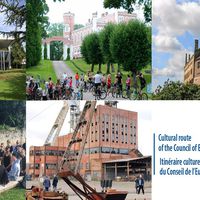New Register of Ibero-American Museums Launched
 In the context of the Ibermuseums programme, which fosters cooperation among museums in Latin America, Spain and Portugal, a new Register of Ibero-American Museums (RMI) was presented in late June. This new online database currently includes details of 6000 museums in 12 countries, but figures are expected to grow in the near future.
The RMI contains fact sheets for the museums included in the project, offering an overview of these institutions in the Ibero-American context. These fact sheets are organised systematically and provide the basic details for each institution, such as the name and description. In certain cases these details are supplemented with information about the institution's history, access mode, services and activities, and representative images.
The information presented has been validated by the relevant authority in each country, in the field of international cooperation and the Ibermuseums Programme. For each country, the register includes museums and museum institutions defined as such in the national legislation or that comply with national regulations, criteria or conventions. The register itself is governed by the conceptual framework that was agreed in the Declaration of the City of Salvador, Bahía (2007), which gave rise to the Ibermuseums Programme.
Inclusion in the register helps to facilitate a greater knowledge of the museum sector and increase its magnitude, both quantitatively and qualitatively. In short, it promotes the overall visibility of the sector and the individual visibility of each of the institutions registered, offering an enormous window on to the museums and their activities, as well as their value and importance in society today.
Museums currently included in the database come from Argentina, Brazil, Chile, Colombia, Costa Rica, Ecuador, Mexico, Paraguay, Peru, Portugal, Spain and Uruguay. In the near future, the RMI is expected to grow to include 9000 museums based in 22 countries.
The RMI was created by the Observatory of Ibero-American Museums with the aim of providing information for the general public and specialists, but also to facilitate knowledge-sharing between government bodies and professionals with responsibilities for museums and to encourage networking and collaboration between institutions.
Information is presented in English, Spanish and Portuguese and is accessible for free. The RMI can facilitate collaboration with museums in other world regions, including Asia and Europe.
In order to access the RMI, please visit http://www.rmiberoamericanos.org
In the context of the Ibermuseums programme, which fosters cooperation among museums in Latin America, Spain and Portugal, a new Register of Ibero-American Museums (RMI) was presented in late June. This new online database currently includes details of 6000 museums in 12 countries, but figures are expected to grow in the near future.
The RMI contains fact sheets for the museums included in the project, offering an overview of these institutions in the Ibero-American context. These fact sheets are organised systematically and provide the basic details for each institution, such as the name and description. In certain cases these details are supplemented with information about the institution's history, access mode, services and activities, and representative images.
The information presented has been validated by the relevant authority in each country, in the field of international cooperation and the Ibermuseums Programme. For each country, the register includes museums and museum institutions defined as such in the national legislation or that comply with national regulations, criteria or conventions. The register itself is governed by the conceptual framework that was agreed in the Declaration of the City of Salvador, Bahía (2007), which gave rise to the Ibermuseums Programme.
Inclusion in the register helps to facilitate a greater knowledge of the museum sector and increase its magnitude, both quantitatively and qualitatively. In short, it promotes the overall visibility of the sector and the individual visibility of each of the institutions registered, offering an enormous window on to the museums and their activities, as well as their value and importance in society today.
Museums currently included in the database come from Argentina, Brazil, Chile, Colombia, Costa Rica, Ecuador, Mexico, Paraguay, Peru, Portugal, Spain and Uruguay. In the near future, the RMI is expected to grow to include 9000 museums based in 22 countries.
The RMI was created by the Observatory of Ibero-American Museums with the aim of providing information for the general public and specialists, but also to facilitate knowledge-sharing between government bodies and professionals with responsibilities for museums and to encourage networking and collaboration between institutions.
Information is presented in English, Spanish and Portuguese and is accessible for free. The RMI can facilitate collaboration with museums in other world regions, including Asia and Europe.
In order to access the RMI, please visit http://www.rmiberoamericanos.org
Similar content
posted on
09 May 2019
posted on
27 Apr 2020
deadline
18 Oct 2013
By Kerrine Goh
25 Jul 2005
15 Mar 2017 - 17 Mar 2017
posted on
12 Dec 2013



